Graduating Biology Majors Shine in Final Semester with Awards and Presentations
Biology major at Saint Leo University opens opportunities for research, graduate school, and fascinating careers
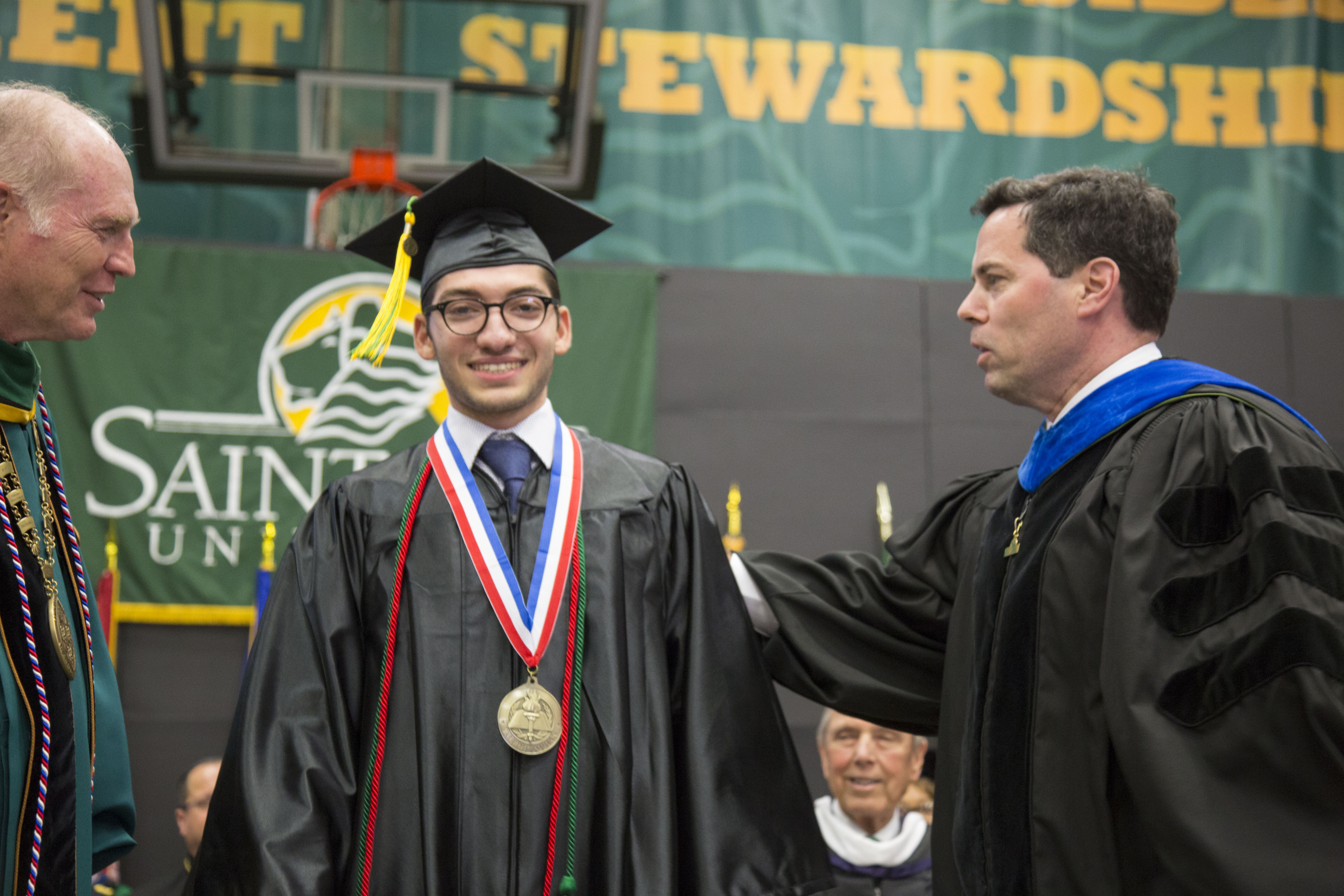
Biology major at Saint Leo University opens opportunities for research, graduate school, and fascinating careers

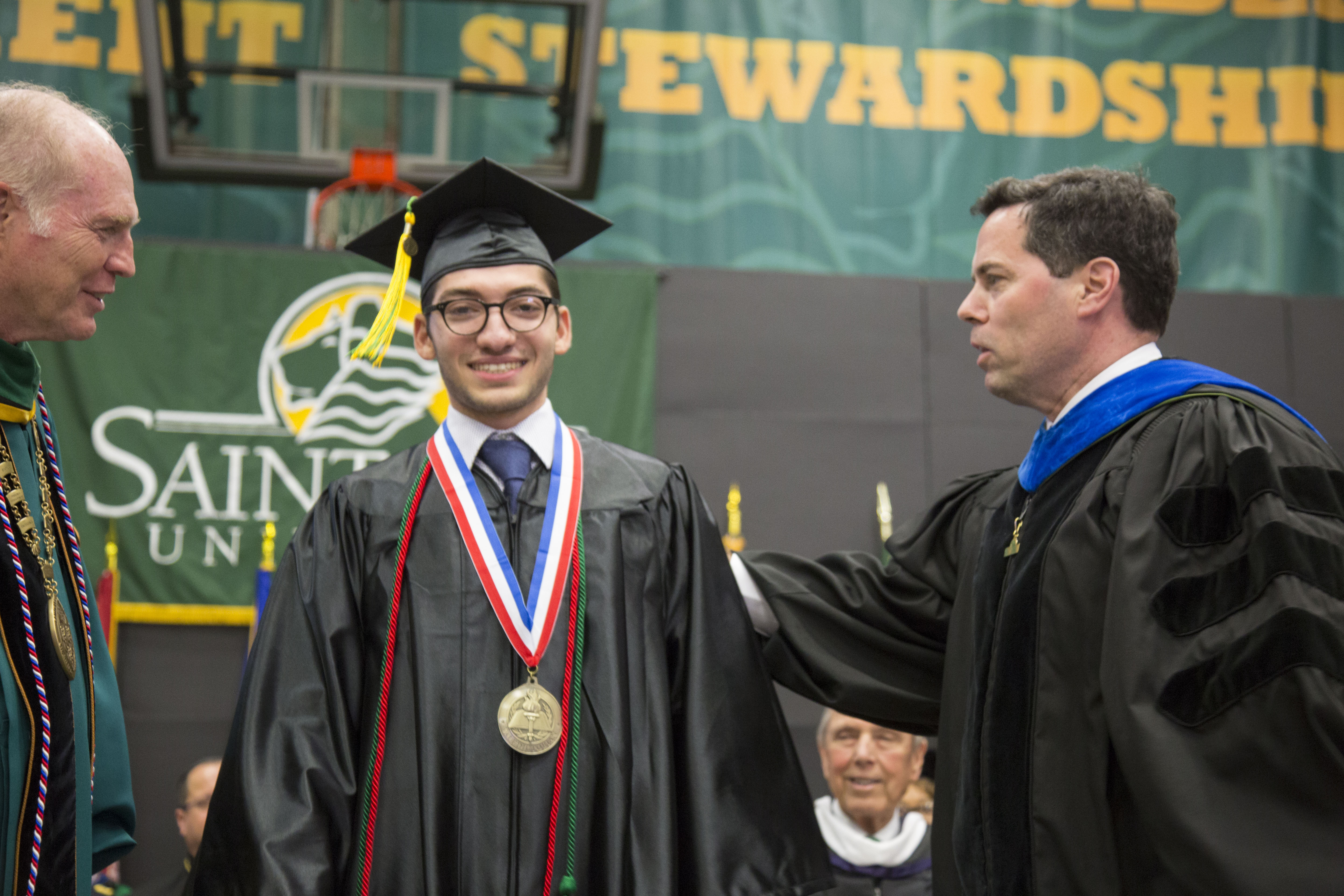 Biology majors graduating from Saint Leo University in April excelled as a group with two taking home the top academic honors for the 2018 graduating class of more than 330 from University Campus. Several more of the 34 new scientists who donned graduation caps and robes over the weekend earned other academic distinctions and accomplished noteworthy undergraduate-level research work.
Biology majors graduating from Saint Leo University in April excelled as a group with two taking home the top academic honors for the 2018 graduating class of more than 330 from University Campus. Several more of the 34 new scientists who donned graduation caps and robes over the weekend earned other academic distinctions and accomplished noteworthy undergraduate-level research work.
Mohamad Almasri, for instance, a summa cum laude graduate of the biology major with a specialization in biomedical and health sciences, was named class valedictorian (pictured with Dr. William Lennox Jr. at left and Dr. Jeffrey Senese at right) during the afternoon commencement on Saturday, April 28. As he is originally from Syria, he took part in the University's Bridge Program that helps international students adapt to studying and learning in academic English and in adapting to American culture.
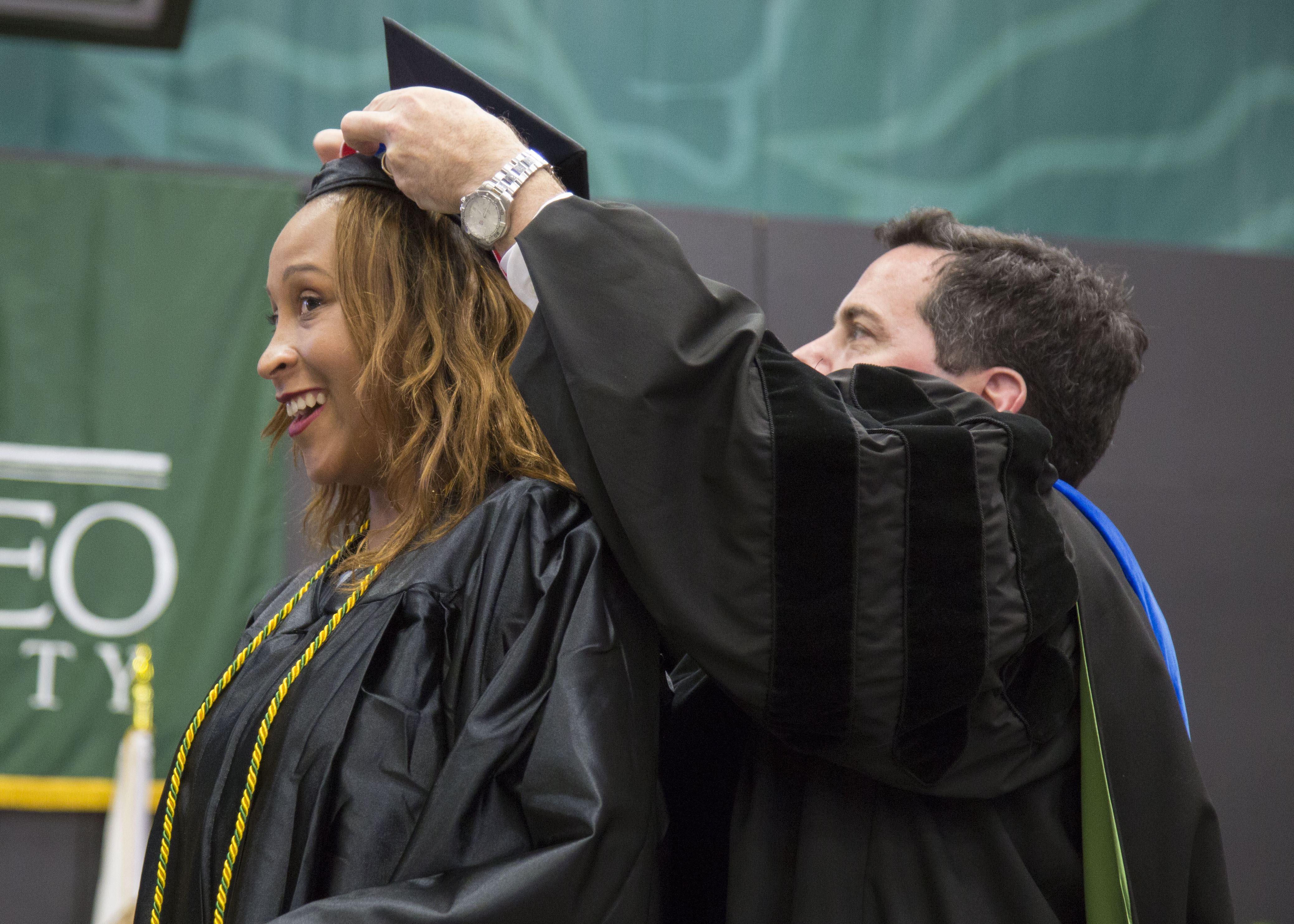 The salutatorian is Marine Beugre-Guyot from France (pictured receiving her academic medal from Dr. Jeffrey Senese at graduation). She is also a summa cum laude graduate of the biology program, from the general track, and played competitive tennis during some of her time at Saint Leo.
The salutatorian is Marine Beugre-Guyot from France (pictured receiving her academic medal from Dr. Jeffrey Senese at graduation). She is also a summa cum laude graduate of the biology program, from the general track, and played competitive tennis during some of her time at Saint Leo.
Sommer Pollard (pictured below), who opted for the specialization in biomedical and health sciences with a chemistry minor, received the top scholastic distinction among University Campus students who completed the rigorous Honors Program. She was given the Areté Award for Academic Excellence. Her Honors Program project was a field guide for children to Weedon Island Preserve. She also graduated magna cum laude and is interested in veterinary science. The Clearwater, FL, played competitive softball for Saint Leo during college, including a double header the day before her commencement.
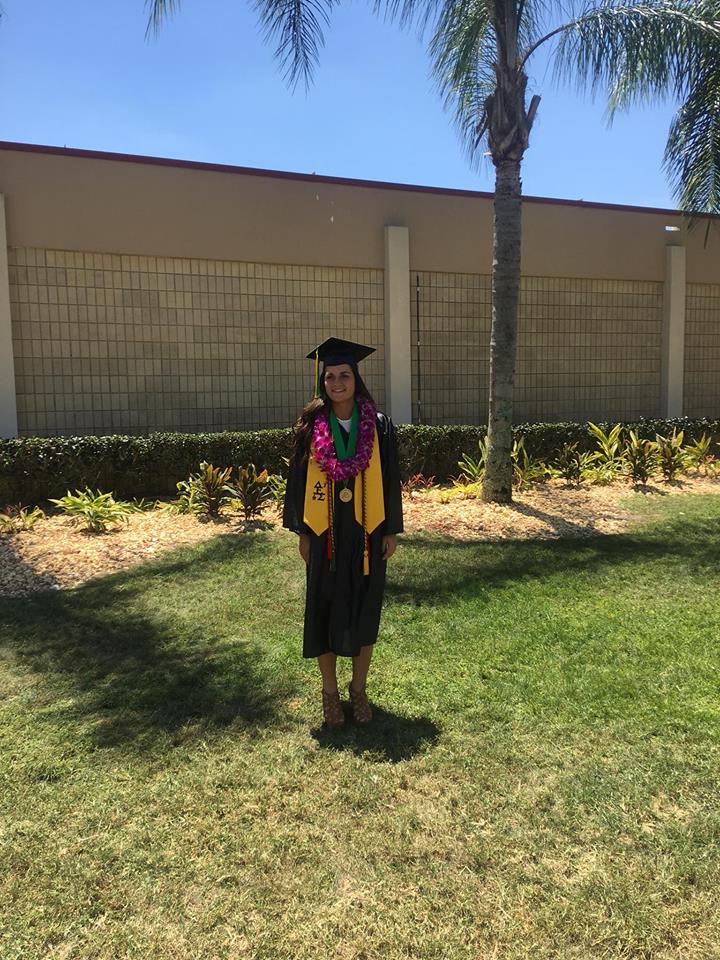 "We are so proud of these students, and we know that the dedication they have demonstrated to their academic studies and to other activities and obligations will allow them to continue to succeed in the future," said Mary T. Spoto, PhD, dean of the School of Arts and Sciences. "It is still too soon for some graduates to know what they will be doing in the fall or next year, but we expect to hear about more Saint Leo science graduates receiving acceptances to graduate programs and health degree programs. They have had the advantages of working in small classes with professors who have terminal degrees, and many engaged in research projects with faculty mentors and have been able to participate in conferences and discuss their work," Dr. Spoto said. "The biology degree from Saint Leo can lead to many different career options," added Dr. Spoto, who is also currently serving also as interim provost and senior vice president of Academic and Student Affairs.
"We are so proud of these students, and we know that the dedication they have demonstrated to their academic studies and to other activities and obligations will allow them to continue to succeed in the future," said Mary T. Spoto, PhD, dean of the School of Arts and Sciences. "It is still too soon for some graduates to know what they will be doing in the fall or next year, but we expect to hear about more Saint Leo science graduates receiving acceptances to graduate programs and health degree programs. They have had the advantages of working in small classes with professors who have terminal degrees, and many engaged in research projects with faculty mentors and have been able to participate in conferences and discuss their work," Dr. Spoto said. "The biology degree from Saint Leo can lead to many different career options," added Dr. Spoto, who is also currently serving also as interim provost and senior vice president of Academic and Student Affairs.
In fact, several biology majors—mostly seniors—traveled cross-country only a week before their graduation to attend a scientific conference and present some of their own research work during conference sessions for undergraduates. They went to the annual meeting of the American Society for Biochemistry and Molecular Biology, held in late April in San Diego, accompanied by Drs. Audrey Shor, Cheryl Kozina, and Sergiy Borysov.
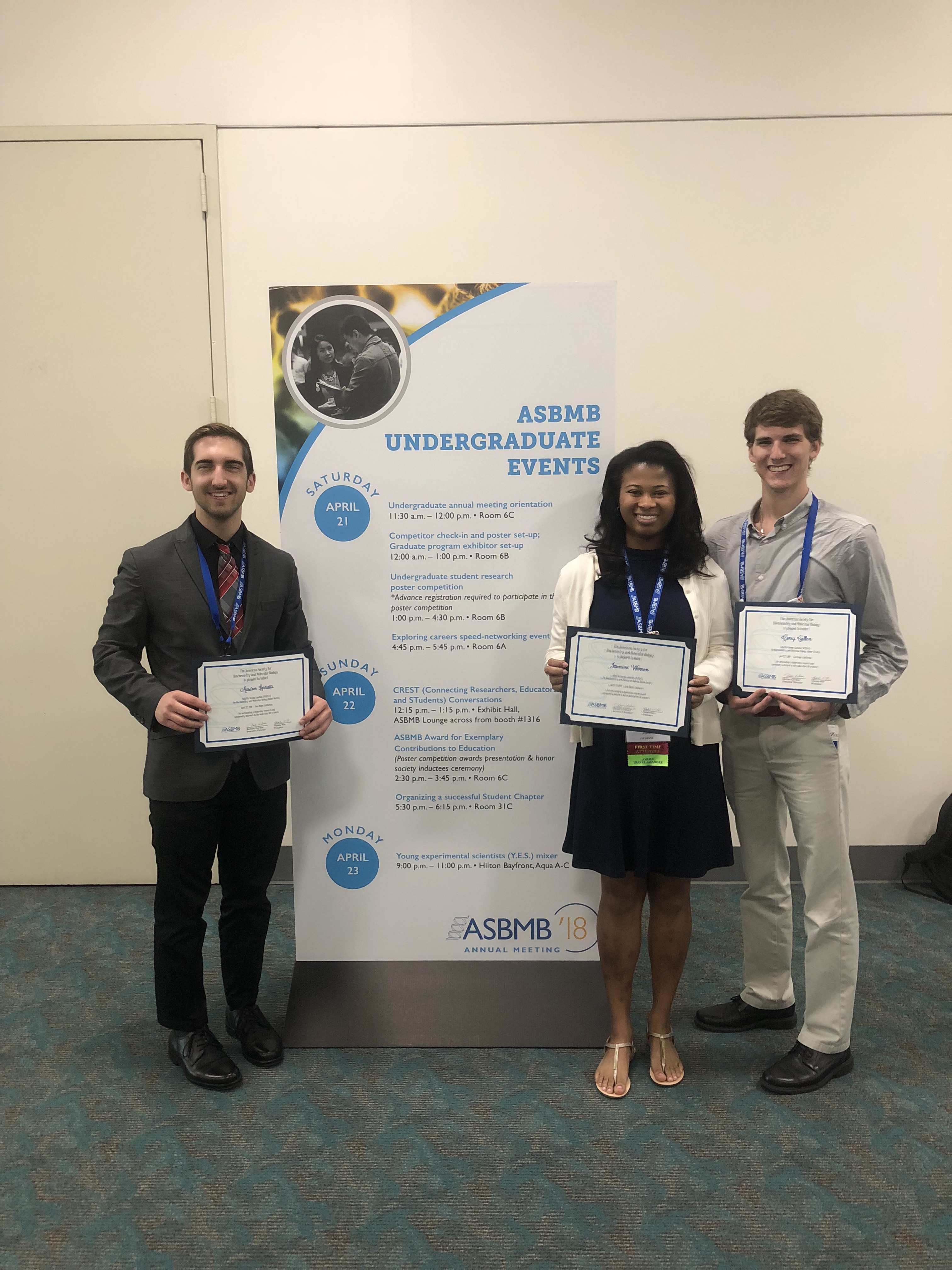 There, three graduating seniors were inducted into the American Society for Biochemistry and Molecular Biology Honor Society, which recognizes exceptional juniors and seniors. Those inducted, shown left to right here, were: Auston Larratta, Jasmine Warren, and Corey Gallen.
There, three graduating seniors were inducted into the American Society for Biochemistry and Molecular Biology Honor Society, which recognizes exceptional juniors and seniors. Those inducted, shown left to right here, were: Auston Larratta, Jasmine Warren, and Corey Gallen.
Auston Larratta presented research collected on an introductory boot camp offered at Saint Leo for incoming freshmen who want to study biology. Larratta graduated magna cum laude, received two awards from Saint Leo's School of Arts and Sciences for academic leadership and overall excellence, and has been accepted into The Ohio State University College of Veterinary Medicine.
Jasmine Warren presented research at the ASBMB conference from her senior seminar in biology on changes seen in black mangroves from stressors associated with climate change. At Saint Leo, she was honored with the School of Arts and Sciences Excellence in Scholarship Award. She also completed the university's Honors Program, and for her project, examined ways of understanding land management.
Also, Corey Gallen led a student group that modeled a protein of interest to researchers studying aging, Alzheimer's disease, and cancer. He worked with two other students in the group, Anapaula Rios-Rosales and Isabella Jacus, who received a travel grant from another organization to attend the conference in San Diego. The students were able to show a three-dimensional model of the protein they studied while in San Diego. Gallen graduated magna cum laude and also completed the Honors Program. His Honors Program work included a project on the safety of vaccination against a virus for his Honors Program project.
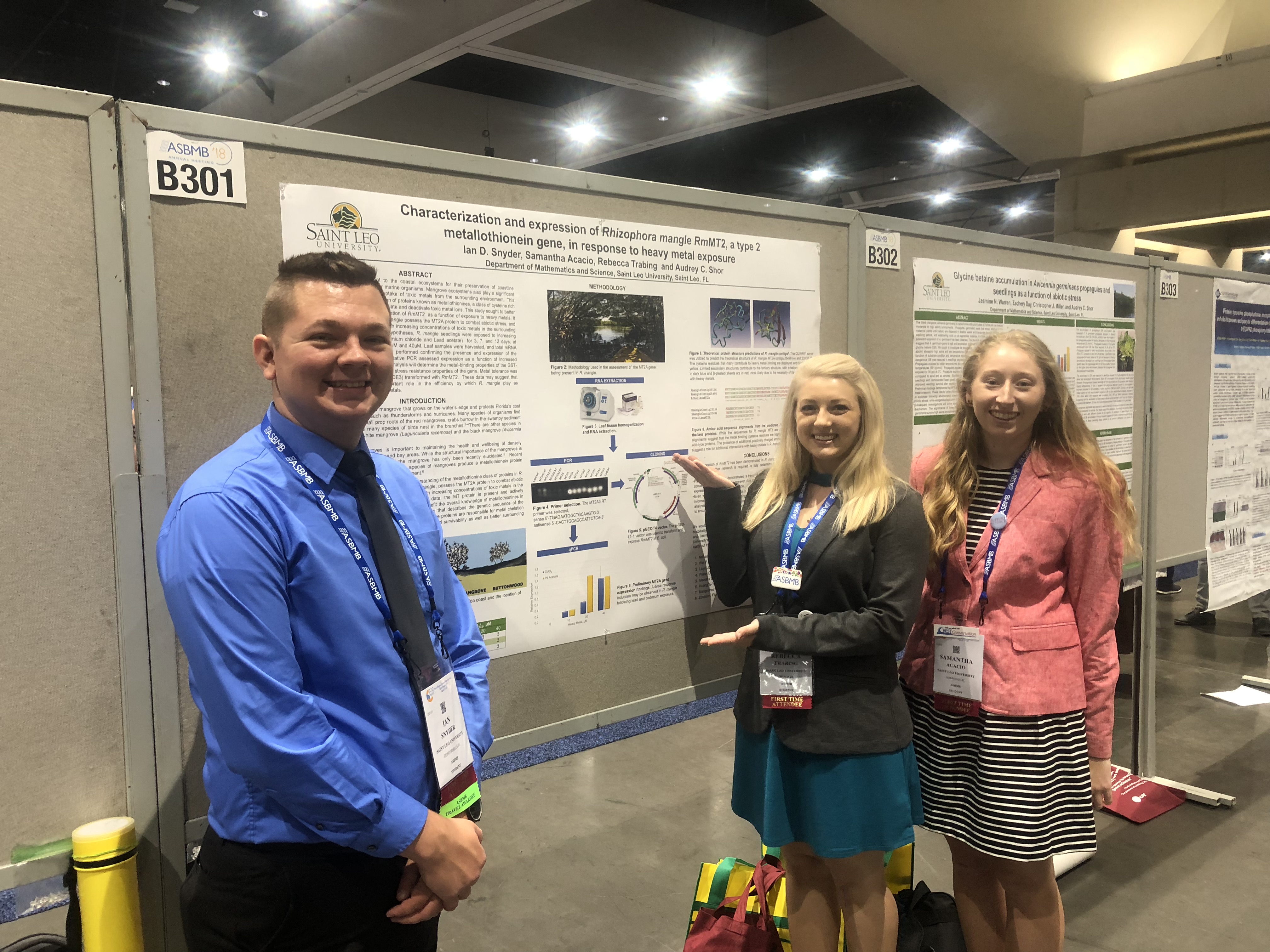 Three other Saint Leo seniors attended the conference as well to present their undergraduate research: Ian Snyder, Rebecca Trabing, and Samantha Acacio, shown left to right, here.
Three other Saint Leo seniors attended the conference as well to present their undergraduate research: Ian Snyder, Rebecca Trabing, and Samantha Acacio, shown left to right, here.
Student Samantha Acacio also traveled to Washington, DC, earlier in the month to participate in a science advocacy day, another project sponsored by the ASBMB. She was chosen to speak with legislators about the importance of funding research, citing examples of the impact the National Science Foundation and the National Aeronautics and Space Administration have had upon her and the research she did as an undergraduate at Saint Leo University.
Two other graduates, Sergio Napoletano (biomedical and health sciences specialization) and Gregory Nobles (ecology specialization, cum laude), worked with Dr. William Ellis and four other students on researching improved methods of video monitoring for shoreline data gathering. The research serves a broader project that uses citizen scientists to help monitor the health of mangroves along the Florida Gulf Coast and potentially in other locations. The research was presented in poster format in March 2018 at the Southeastern Estuarine Research Society meeting, held in St. Augustine, FL.
Saint Leo offers biology as a major only at University Campus. Students can elect to study a general track, a specialization in ecology, or a specialization in biomedical and health sciences. Another option, for those interested in teaching, is to major in biology with a minor in education. All biology majors study for the Bachelor of Science degree.